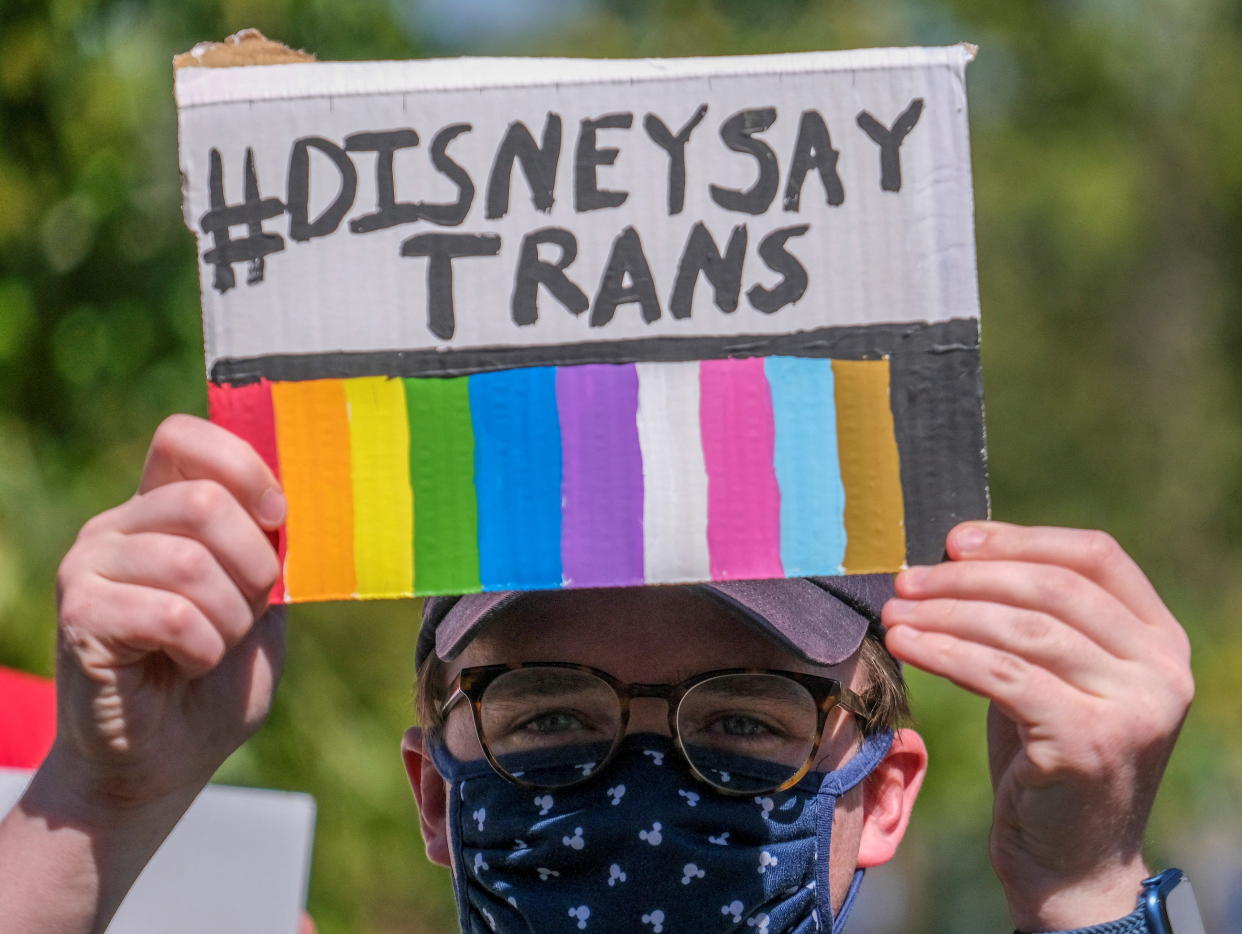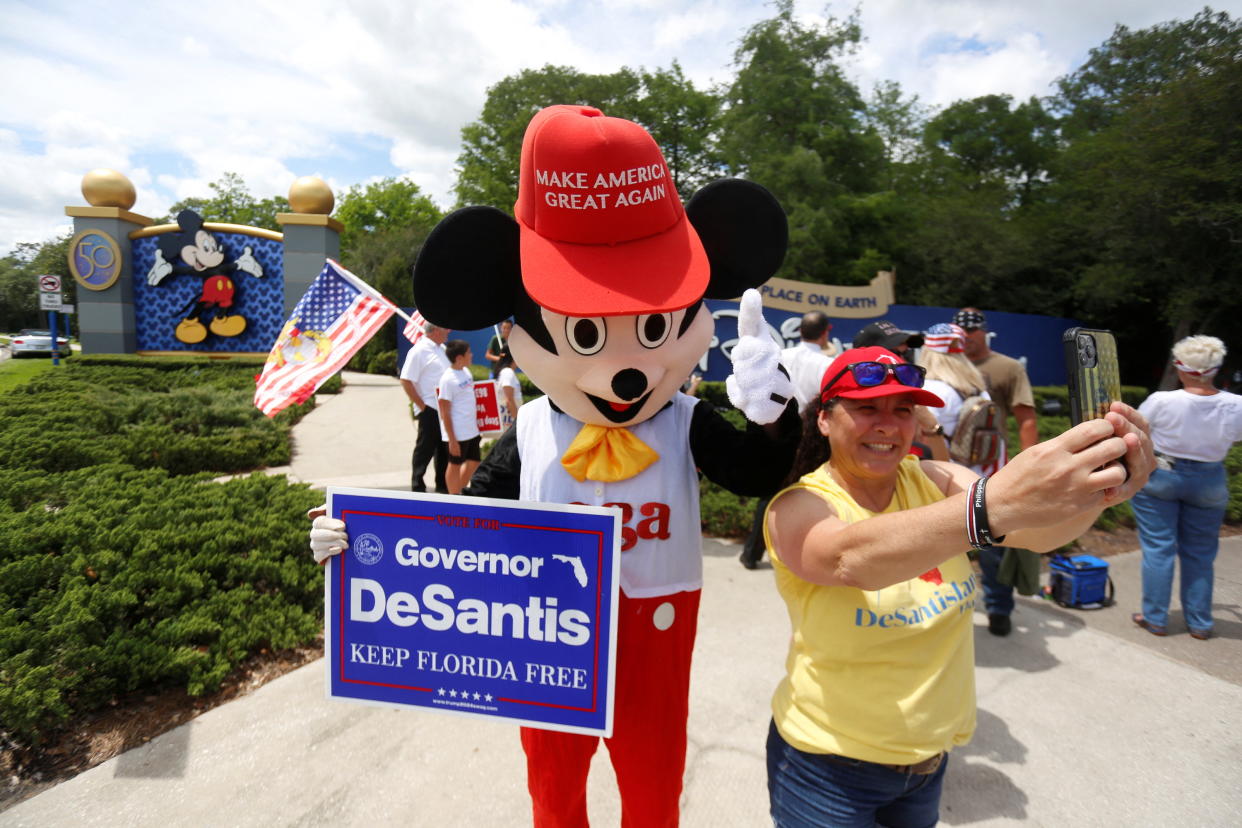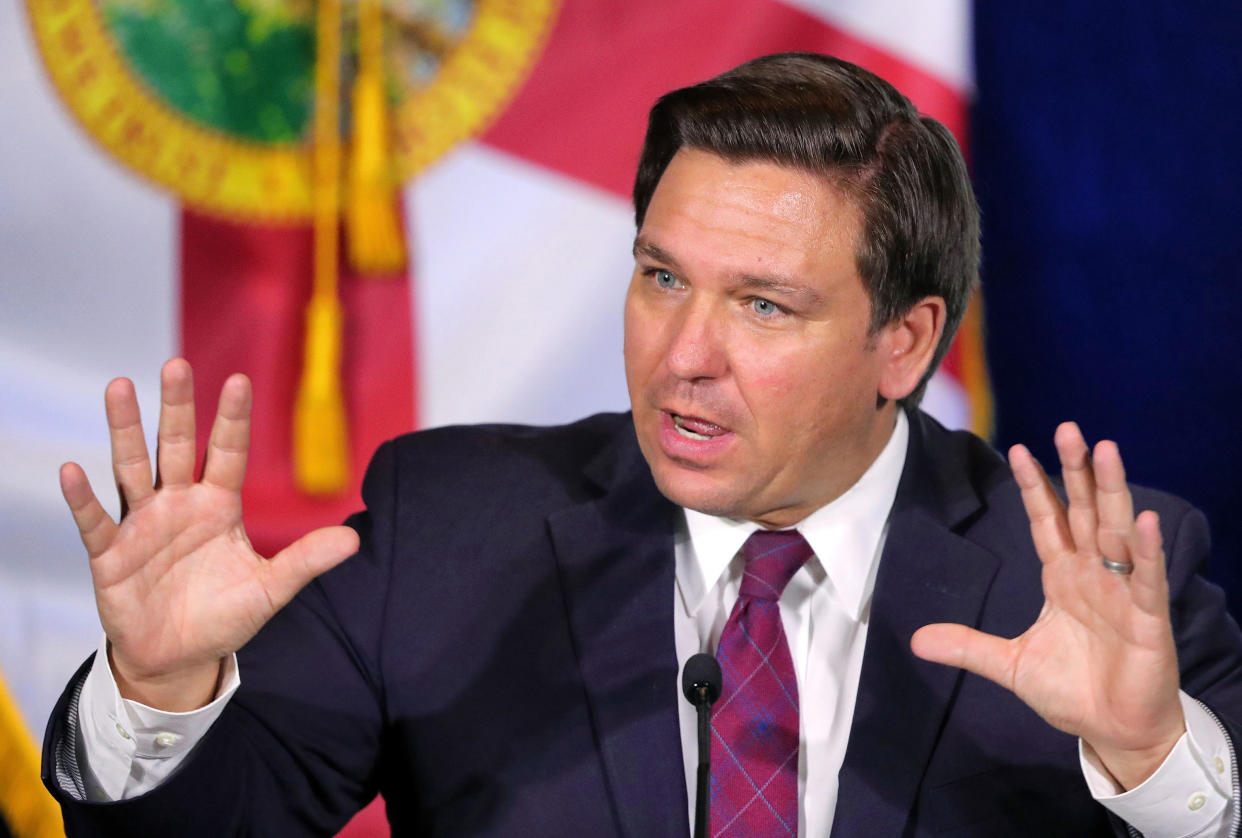Disney should tell Florida Gov. DeSantis to pound sand
Republicans used to argue that government should get out of the way and leave businesses free to work their capitalist magic. Ronald Reagan is so passé. In Florida, Texas and other GOP states, Republicans are now enlisting businesses in culture-war politics and punishing them if they don’t go along.
Disney (DIS) is now in a standoff with Florida Gov. Ron DeSantis and other state Republicans over a new law banning instruction on sexual orientation and gender identification among young schoolchildren. The entertainment giant employs about 80,000 Floridians near its Disney World complex in Orlando, and CEO Bob Chapek decided not to take a public stance on the so-called “don’t say gay” bill as legislators were drafting it earlier this year. With at least 150 other big companies publicly denouncing the bill, Disney seemed conspicuously silent, and Disney workers began agitating for the company to publicly oppose the bill.
On March 9, Chapek finally came out against the bill, sending an open letter to all Disney employees, apologizing for vacillating. DeSantis and his allies in the legislature pounced. They drafted a new bill, which DeSantis signed on April 22, revoking tax and self-governing privileges Disney has enjoyed since it began planning Disney World in 1967. Disney hasn’t responded yet, but the change could cost the conglomerate hundreds of millions in foregone tax benefits and raise the cost of running Disney World. The company’s stock underperformed the S&P 500 as Florida legislators introduced the bill, and sank 2.7% the day DeSantis signed it.

Why Disney shouldn't compromise
There’s an escape hatch. The law won’t go into effect until June 1, 2023, giving both sides more than a year to find a compromise. But Disney shouldn’t meet in the middle. The company should stand its ground and let Florida politicians be the ones to play stupid games. Disney doesn’t even need to argue the merits of the kiddie-protection law. Snubbing the politicians would be good business and solid management, regardless of the morality of the underlying issue.
DeSantis and his fellow Florida Republicans are trying to put Disney in a choose-and-lose position. This is the cultural warfare Republicans in the Trump or post-Trump era feel they must wage to get and keep power. They don’t really want to punish Disney as much as they want Disney to flip and sell out the many employees and customers who feel the Florida law is bigoted against the LGBTQ community, and others. That’s the win the DeSantinistas are after, and the “victory” they want to deliver to conservative voters is the humiliation of the woke left, or a bloc they can claim represents it.
[Follow Rick Newman on Twitter, sign up for his newsletter or send in your thoughts.]
No business should allow politicians to exploit it as an extension of partisan political warfare. Florida isn’t (yet) communist China, where a totalitarian government sets rules companies can either abide by, or leave. Disney can continue operating in Florida no matter what, while politicians have 13 months to decide if they really want to disrupt a local governing structure nobody was complaining about and transfer more of the management burden to local residents.
In this age of politicized everything, CEOs of public companies need to know whom they are most accountable to, with a deep prioritization scheme. This varies by company and depends a lot on whether the business is a consumer-facing organization with wide name recognition, as Disney obviously is. That makes you vulnerable to consumer boycotts and all the bad publicity those can bring, which is not just a moral and ethical issue but also a bottom-line concern that affects profitability.

The term “stakeholders” is wishy-washy, but there are other constituencies CEOs must care about to run their businesses well. Employees are an important one, especially in a big company such as Disney that depends on employee-customer interaction. Companies need to get along in the communities where they operate. They have suppliers that need to succeed. This is all in the interest of maximizing value for shareholders, which is a concoction of tangible factors like revenue and profit margin, and intangibles like morale.
How accountable should businesses be to politicians? The right answer is, not very much. Well-connected pols can, of course, make business better and contribute to shareholder value, through easier regulation or favorable tax policy. But they usually expect something in return, which can blow up if politicians make demands that could undermine the company’s accountability to other key groups.
That’s what Florida Republicans are doing to Disney—essentially demanding that the company prioritize their political cause over employees and customers. Framed this way, it’s an easy call. Chapek and the Disney board should tell the DeSantinistas to pound sand and get out of Disney’s business. The company will decide for itself what stance it takes on controversial social and cultural issues, based on the sentiment of people who actually run, service and patronize the company—not on preening rabble-rousers in front of TV cameras.
This will cost Disney in the short run
It will cost Disney some money. The company has yet to say how much, but Disney can afford it. COVID damaged Disney’s travel-related businesses, leading to bad years in 2020 and 2021. In 2019, however, Disney earned a hefty $11 billion in profit, with a solid margin of 15.9%, and it’s rebounding now as COVID eases and travel recovers. Other Orlando-area parks such as Universal and SeaWorld don’t get Disney’s self-governing deal, so Disney won’t be at a disadvantage. And at this point, with the GOP’s extortion attempt out in the open, Disney could lose more in brand equity by giving in than it may lose in tax benefits.
The Republicans might also cave. Local officials in the Orlando area say it will be “catastrophic” if their municipalities have to assume responsibility for services Disney now provides, and take over nearly $1 billion in municipal debt Disney holds. Disney could make tax payments to offset some of that, but taxes could also rise on locals having nothing to do with the dispute. If the outrage reaches from Orlando to Tallahassee, Republicans hoping to punish Disney might backtrack.

Any CEO operating today has to know political disputes are a rising threat, as Republicans wage their culture wars through legislation and far-left Democrats such as Bernie Sanders and Alexandria Ocasio-Cortez provide a target-rich environment. In Texas, Republican Gov. Greg Abbott has jammed up Mexico border crossings by demanding more truck inspections, a way of protesting President Biden’s planned loosening of some COVID-screening rules for migrants. But Abbott’s plan backfired by causing massive transport delays and raising prices of affected products. The conservative Wall Street Journal editorial page called it a “stunt” that was “obstructing legal commerce.”
Several Republican states are putting strict limits on abortion rights, assuming the Supreme Court will overturn the longstanding Roe v. Wade abortion protections in what seems sure to be a historic ruling this June. That could trump all other culture wars to date, in some cases forcing businesses to take a stand likely to be unpopular with somebody. If you can’t please everybody, the next best thing is to invoke defensible principles the people closest to your business will respect.
Rick Newman is the author of four books, including "Rebounders: How Winners Pivot from Setback to Success.” Follow him on Twitter: @rickjnewman. You can also send confidential tips.
Follow Yahoo Finance on Twitter, Instagram, YouTube, Facebook, Flipboard, and LinkedIn
